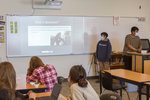

Woodland High School students recently looked into a topic affecting students all over the country: suicide and depression.
Students learned about the topics through research, then brainstormed solutions. Some ideas included having a counselor reach out to students or encouraging students to speak up if they saw a friend displaying potential risk factors, according to a news release.
The group presented information about family expectations, stress and pressure on teens to perform. Positive expectations can help students achieve good grades and respect classmates, while negative pressures can cause teens to feel insecure or develop anxiety, stated the release.
Rayleah Trice, a 2021 graduate, read several reports about mental health issues impacting young adults during the pandemic, so she started volunteering for a teen-focused suicide hotline, the release stated.
“I thought I could use my own experiences to help support people,” Trice said. “I think schools could really help students by reaching out and teaching them about their own mental health to make sure students are healthy.”
She also visits schools that have lost a teen to suicide, stated the release. Trice speaks with students who want to talk with someone about their emotions and experience.
“It’s a vital need for teens to realize they’re not alone when it comes to stress, pressure or having feelings of depression,” she said. “If a student is suffering from mental illness, it can be challenging for them to pay attention during class which can further exacerbate the conditions they’re already experiencing.”
Teachers also were involved in suicide prevention efforts.
Aaron Blackwelder, a Woodland High School English language arts teacher, wanted students to take a closer look into the topic of suicide described in Shakespeare’s “Romeo and Juliet.”
“Rather than just reviewing the events that led to the couple’s suicide, I thought we should add solutions that could have positive effects on our high school community,” Blackwelder said. “This year, we also involved administrators and counselors who attended to listen to the issues and suggestions presented by our students.”
Blackwelder hoped to encourage his students to learn about issues affecting both their own population as well as the greater community to become more engaged with the concepts, stated the release.
“A lot of students have shared their projects with kids at other schools,” he said. “The impact of their learning has become more widespread and could potentially improve how many schools address these issues.”
The nonprofit Lines for Life operates YouthLine, a teen-to-teen support service. The national helpline provides crisis support via call, text and chat. For more information, visit YouthLine’s website at oregonyouthline.org.